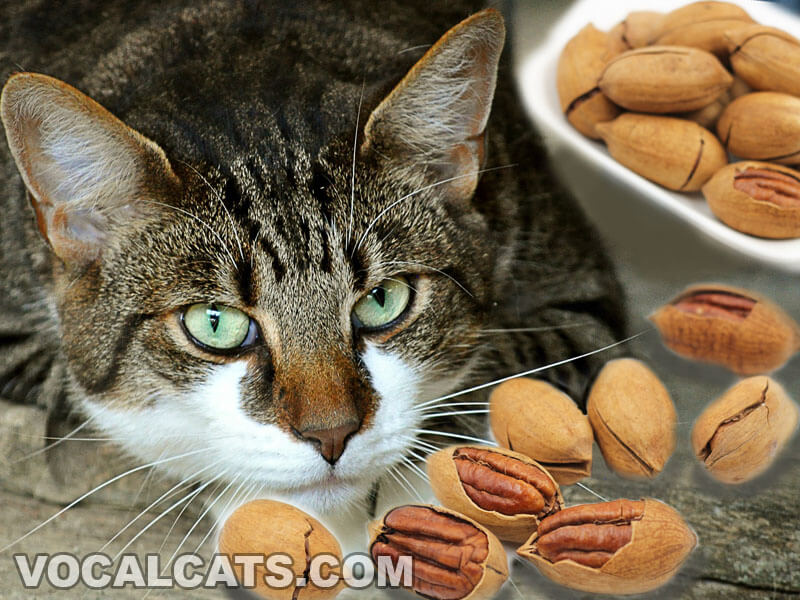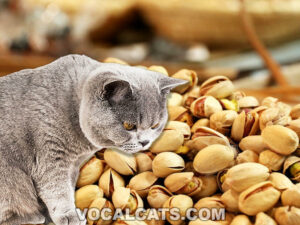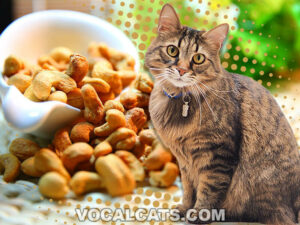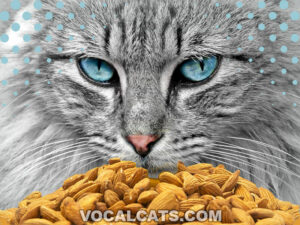Can Cats Eat Pecans? No, cats should not eat Pecans because they are high in fat which is difficult for felines to digest. Regular consumption can cause digestive problems like vomiting and diarrhea. In the long run, your cat may suffer from kidney disease, pancreatitis, or even obesity. Due to their hard texture, Pecans are also hard to swallow and can be a choking hazard.
At least once, every cat owner will face the dilemma of the types of human food they can give to their furry friends. One such food or snack is Pecans.
Before feeding your cat anything that is not specifically formulated for them, it’s important to do your research. Just because crunchy nuts like walnuts and Pecans are safe for humans doesn’t necessarily mean that they are safe for cats.
In this article, we’ll take a closer look at Pecans and whether or not cats can eat them, as well as what happens to your cat’s health if they consume Pecans regularly.
Contents
- Can Cats have Pecans?
- What are Pecans?
- Are Pecans bad for Cats?
- Are Pecans toxic to Cats?
- Are Cats allergic to Pecans?
- So, are Pecans harmful to Cats?
- Are Pecans safe for Cats?
- Are Pecans good for Cats?
- What happens if my Cats Eat Pecans? What should I do?
- Pecans and Cats
- Can cats eat Pecan shells?
- Can Cats Eat Pecan Pie?
- Can cats have Pecan Pie?
- Can cats eat Pecan ice cream?
- Can cats eat roasted Pecans?
- So, Can Cats Eat Pecans?
- Related Questions
Can Cats have Pecans?
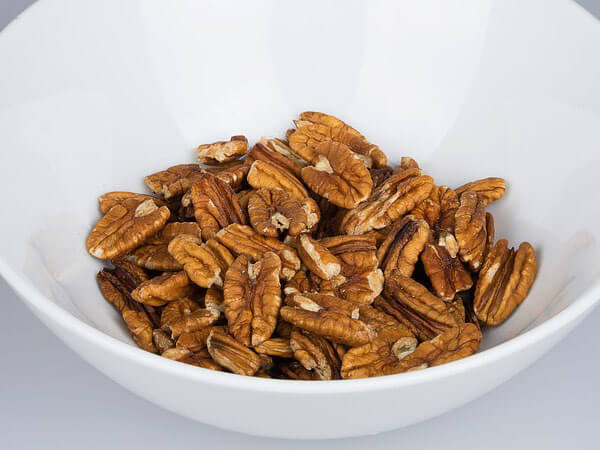
No, cats should not have Pecans because as obligate carnivores, a cat’s diet should primarily contain animal protein, such as chicken and fish.
Pecans are also high in fat. Too much fat in their diet can upset their digestive system. Therefore, if your fuzzy friends enjoy eating Pecans, moderation is key.
RECOMMENDED: Can Cats Eat Pistachios?
What are Pecans?
Pecans are a type of tree nut that is native to North America, specifically the southern United States and Mexico. The Pecan tree (Carya illinoinensis) is a species of hickory tree that can grow up to 130 feet tall and produce a large crop of nuts each year.
Pecans have a smooth, thin shell that encases an edible kernel that is high in fat and protein.
The kernel is commonly used in baking, cooking, and as a snack.
Pecans have a sweet, nutty flavor and a buttery texture and are a good source of fiber, healthy fats, and several vitamins and minerals, including vitamin E, potassium, magnesium.
Are Pecans bad for Cats?
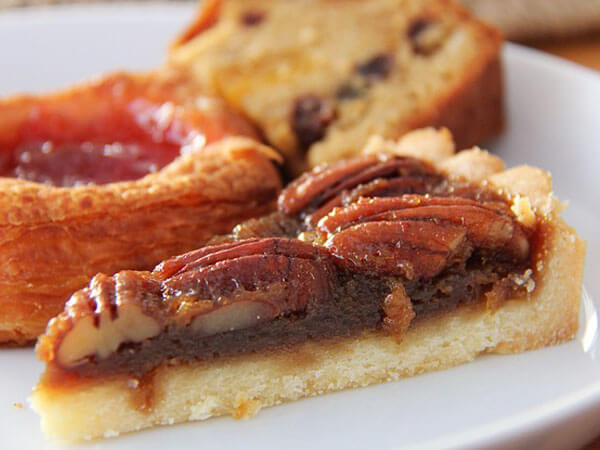
Yes, Pecans are bad for cats for a variety of reasons ranging from high fat content that can cause liver disease, pancreatitis, and obesity, to choking hazard and juglone toxicity.
Let’s discuss all of these in more detail below.
1. Juglone Toxicity
Pecans contain a toxin known as juglone, which is toxic to cats. It is found in bark, leaves, and nuts of the Pecan tree.
Although the juglone concentration in Pecans is less than that in walnuts, it is still enough to poison your cat.
Juglone poisoning includes the following signs and symptoms:
- Vomiting.
- Diarrhea.
- Tremors.
- Lethargy.
- Seizures.
Pecans also contain aflatoxins that originate from a mold called aspergillus. This is a natural poison that can harm your cat.
Therefore, make sure to keep Pecans out of your feline friend’s reach and buy only fresh Pecans if they enjoying eating it.
2. Fatty Acid Imbalance
Pecans are high in omega-6 fatty acids, which can contribute to an imbalance of omega-3 and omega-6 fatty acids in cats.
Omega-3 fatty acids are anti-inflammatory in nature, while omega-6 fatty acids are pro-inflammatory. An imbalance of the two can cause chronic inflammation and can result in cancer, diabetes, obesity, and arthritis.
According to Merck Vet Manual, the Association of American Feed Control Officials (AAFCO) recommends a minimum of 0.5% omega-6 fatty acids in an adult cat’s diet.
3. Liver Damage
Because Pecans are rich on omega-6 fatty acids, they can cause liver disease in cats if consumed in large quantities or consistently.
One of the most common causes of liver disease in cats is hepatic lipidosis, also known as fatty liver disease.
This occurs when the liver becomes overwhelmed by an excessive amount of fat, which can lead to liver cell damage and impairment of liver function.
4. Pancreatitis
Pecans, along with other high-fat foods, can trigger pancreatitis in cats. Pancreatitis is a condition in which the pancreas are inflamed, and it can become a life-threatening condition for your pet.
When cats consume a high-fat diet, their pancreas are stimulated to produce digestive enzymes to break down the fat.
In some cats, due to the high-fat intake, the pancreas are overstimulated, leading to the production of large amounts of digestive enzymes that can damage the pancreas, resulting in inflammation and pancreatitis.
5. Kidney Disease
Kidney disease in cats is a common condition, especially in older cats, and it can be caused by a range of factors, including infections, toxins, metabolic disorders, and genetic predisposition.
One of the most common types of kidney disease in cats is chronic kidney disease (CKD), which is characterized by a gradual loss of kidney function over time.
Feeding your cat a diet that is too high in protein or other nutrients can increase the risk of developing or exacerbating CKD in cats, especially in cats that already have a kidney disease.
Pecans contain too much protein and this can exacerbate the existing kidney disease in cats and inflict further damage.
6. Nutrient Deficiencies
Pecan aren’t a great snack for your cat because cats are obligate carnivores that require a lot of animal protein in their diet.
This is because animal protein consists of an amino acid known as taurine that plays an important part in feline’s health, such as maintaining their sharp vision, promoting reproductive health, and keeping their heart and immune system healthy and strong.
7. Choking Hazard
The rough texture of Pecans can make it hard for cats to chew on properly and swallow. The rough edges of half-swallowed Pecans can easily lodge themselves into your pet’s throat and can be a choking hazard, blocking your cat’s airways.
Some of the jagged edges can hurt your feline friend’s gums and stick between their teeth which can be very irritating and discomforting for your precious kitty too.
You may be interested in: Can Cats Eat Almonds?
Are Pecans toxic to Cats?
So, are Pecans poisonous to Cats? The answer is yes, Pecans can be toxic to cats if they eat them in large amounts.
Pecans contain a toxin called juglone, which can cause gastrointestinal upset, vomiting, diarrhea, abdominal pain, and lethargy in cats.
Additionally, the high fat content in Pecans can also cause pancreatitis in cats, which is a serious condition that requires veterinary treatment.
Therefore, it is best to keep Pecans and other nuts away from your fuzzy friends to prevent accidental ingestion.
If you suspect that your cat has eaten Pecans or any other food that may be toxic to them, you should contact your veterinarian immediately.
Are Cats allergic to Pecans?
Pecan allergy is quite uncommon in cats, but some cats can still be allergic to Pecans. If your cat is experiencing symptoms like vomiting, diarrhea, skin sores, or itching right after ingesting a Pecan or two, it is probable that she may have Pecan allergy.
In that case, we highly recommend that you bring your feline family member to the vet immediately to begin examination and treatment.
Pecans can also be harmful for cats who have a history of allergies or skin issues like atopic dermatitis or eczema.
So, are Pecans harmful to Cats?
Yes, Pecans are harmful to cats for a number of reasons. They contain a lot of fats which can be difficult for cats to digest. This can cause an upset stomach, vomiting, abdominal pain, and diarrhea.
The high-fat content can also affect your cat’s pancreas leading to pancreatitis.
Furthermore, due to its hard texture, Pecans can be difficult for cats to chew properly. If it is not chewed properly, it can be hard for cats to swallow and this can be a choking hazard for them.
READ NEXT: Can Cats Eat Cashews?
Are Pecans safe for Cats?
No, Pecans aren’t safe for cats because they are not only high in fat but also are usually coated with salt and are difficult to chew.
Cats can have less than 3/4 of a teaspoon of salt in a day. More than this can result in sodium poisoning that is characterized by vomiting, lethargy, diarrhea, incoordination, and seizures.
Too much salt also leads to electrolyte imbalances which can affect your pet’s kidneys. For these reasons, it is better that you don’t give your cat Pecans at all and keep them out of your feline friend’s reach.
Are Pecans good for Cats?
Pecans are not considered to be good for cats as they offer little nutritional value and can cause digestive problems and other health issues if consumed in excess.
They are high in calories, which can contribute to weight gain and obesity in cats. This increases the risk of health problems such as arthritis, diabetes, and heart disease.
Moreover, Pecans don’t have the nutritional profile that is suitable for cats. While they contain some vitamins and minerals, they are lacking in essential nutrients that cats require, such as taurine, which is important for heart and eye health.
Also, some cats may be allergic to Pecans or other nuts, which can cause symptoms such as itching, swelling, and difficulty breathing.
Therefore, vets don’t recommend feeding Pecans to your feline friend or adding them as a regular part of their diet. Instead, cats should be fed a balanced and nutritionally complete diet that is appropriate for their age, weight, and health needs.
What happens if my Cats Eat Pecans? What should I do?
If your cat ate a Pecan, you should keep an eye on her to check if she is showing any signs of poisoning or symptoms like vomiting, diarrhea, lethargy, abdominal pain, and loss of appetite.
If she shows clear signs of distress, you should contact your veterinarian for advice. They can provide guidance on the appropriate course of action based on your cat’s individual situation.
The treatment options that your vet may recommend depend on how severe the symptoms are. Some of the common treatment options available are:
- Inducing vomiting: If your cat has consumed a lot of Pecans or the Pecan is stuck in your cat’s throat, the vet may administer medication that induces vomiting in your cat to remove the Pecan from the cat’s stomach or throat.
- Activated charcoal: Activated charcoal absorbs toxins so they won’t flow into the cat’s bloodstream. In this case, the charcoal will remove any toxins present in the digested Pecan to help prevent further absorption of toxins.
- Supportive care: Supportive care includes providing fluids and medications to manage symptoms such as vomiting, diarrhea, and abdominal pain. Your vet may also monitor your cat’s vital signs and provide additional treatments as needed.
- Hospitalization: In severe cases of Pecan ingestion, your vet may recommend hospitalization so your cat can receive intensive care. This can be recommended in cases when your cat is showing signs of some serious complications or pancreatitis.
- Surgery: In extreme cases, surgery may be necessary to remove Pecans from your pet’s digestive tract. Surgery is the last option and is done when your cat has ingested a lot of Pecans and they are also lodged in her throat or digestive tract.
Overall, the treatment options for Pecan ingestion in cats will depend on the individual cat’s symptoms and the severity of the ingestion.
After treatment, you should continue to monitor your cat for any signs of ongoing symptoms or complications. Also keep Pecans away from your cat’s reach to prevent future incidents like these.
Pecans and Cats
As we have established by now, Pecans are not good for cats due to many reasons. Now, we’ll discuss whether foods that contain Pecans are harmful for cats too.
Can cats eat Pecan shells?
No, cats should not eat Pecan shells because they can be a choking hazard for cats and also cause digestive issues. Pecan shells are tough and difficult to digest.
Once ingested, the shells can cause obstructions or irritations in your pet’s digestive tract. If your cat swallows a cracked Pecan shell, the sharp edges of the shell fragments can tear the lining of the throat, esophagus, and gastrointestinal tract.
Furthermore, Pecan shells contain toxins like tannins and phytates that can interfere with nutrient absorption and cause digestive upsets in cats.
Can Cats Eat Pecan Pie?
No, cats should not eat Pecan pie. Vets don’t recommend feeding your cat Pecan pie or any other types of pie, as they may contain ingredients that can be harmful to your fuzzy friends.
Pecan pie typically contains sugar, butter, eggs, and other ingredients (such as corn syrup or maple syrup) that are not suitable for your cats’ digestive systems.
In addition, the high sugar and fat content of Pecan pie can contribute to weight gain and other health problems in cats.
Due to the high sugar content in Pecan pie, cats can experience heaviness, vomiting, or diarrhea in the short run. In the long run, they can suffer from pancreatitis, diabetes, obesity, or renal failure.
Can cats have Pecan Pie?
No, cats should not have Pecan pie. It is best for cats to not have Pecan pie because apart from sugar and butter, it can also contain ingredients such as chocolate or raisins, which are both toxic to cats and can cause serious health problems if ingested.
Chocolate contains a compound called theobromine, which can cause vomiting, diarrhea, seizures, and even death in cats.
Raisins and grapes can cause kidney failure in cats and should be avoided. If you want to give your cat a special treat, it is best to choose a cat-specific treat that is formulated to meet their nutritional needs.
Fortunately, there are many cat treats available on the market that are designed to be safe and healthy for cats to eat. If you are unsure which treat to get for your cat, you can consult with your veterinarian.
Can cats eat Pecan ice cream?
No, Pecan ice cream is a big no-no for cats. Not only is it cold, but it also contains milk and sugar, two ingredients that vets don’t recommend for cats at all.
As obligate carnivores, a cat’s diet should mainly consist of animal protein like chicken and fish.
A cat’s digestive system is not designed to process plant-based food like Pecans, and sugar. Consuming these in large quantities can cause vomiting, and diarrhea. In addition, the high sugar content in ice cream can lead to weight gain and diabetes.
Also, cats lack the enzyme lactase to break down the milk protein, lactose, present in milk. This can also cause digestive issues such as vomiting, diarrhea, and upset stomach.
Can cats eat roasted Pecans?
No, cats should not eat roasted Pecan. It is not recommended to give roasted Pecans to your feline friend because they are not a part of a cat’s natural diet and can be difficult for them to digest.
Roasting Pecans does not change their nutritional profile. Thus, they can still be difficult for cats to digest and may cause digestive upset or gastrointestinal issues.
Furthermore, Pecans are high in fat, which can contribute to obesity and other health problems in cats.
Overall, it is best to avoid giving your cat roasted Pecans or any other human foods unless recommended by a veterinarian.
So, Can Cats Eat Pecans?
In conclusion, you shouldn’t feed Pecans or any other human foods to cats. Pecans are not a part of a cat’s natural diet, and their digestive system is not designed to process nuts or dairy products like ice cream.
Pecans are also difficult to digest and can cause gastrointestinal upset, pancreatitis, kidney disease, or liver damage.
Therefore, it’s essential to stick to a well-balanced and nutritious cat food that meets their specific nutritional needs. You can consult with a veterinarian if you have any concerns regarding your cat’s health and dietary requirements.
Related Questions
Macadamia nuts, pecans, walnuts, and hickory nuts are all toxic to cats.
If a cat eats Pecans, he can choke on them due to the Pecan’s rough texture. Because Pecans are high in fats, cats can suffer from obesity, diabetes, and stomach upsets, like diarrhea and vomiting. Consistent consumption of nuts can lead to pancreatitis, kidney failure, or liver damage in cats.
DISCLAIMER: THIS WEBSITE DOES NOT PROVIDE MEDICAL ADVICE
The information, including but not limited to, text, graphics, images and other material contained on this website are for informational purposes only. No material on this site is intended to be a substitute for professional veterinary advice, diagnosis, or treatment. Always seek the advice of your veterinarian or other qualified health care provider with any questions you may have regarding dietary needs.
Resources:
https://en.wikipedia.org/wiki/Pecan
https://www.ncbi.nlm.nih.gov/pmc/articles/PMC7105028/
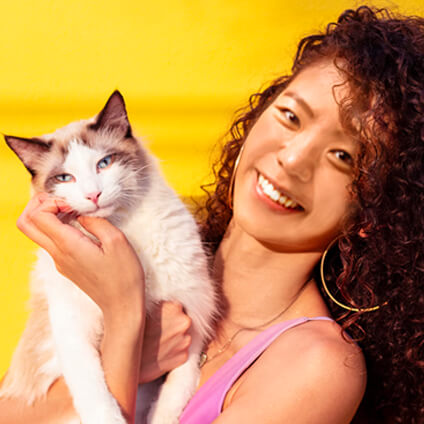
With over five years of specialized experience as an animal writer, my expertise lies in cat nutrition, health, behavior, grooming, and training. I am dedicated to delivering helpful and informative content that caters to the well-being of our feline friends. My primary goal is to empower pet owners with knowledge and ensure our feline companions thrive in health and happiness. In my free time, I love volunteering at local cat rescue centers.
